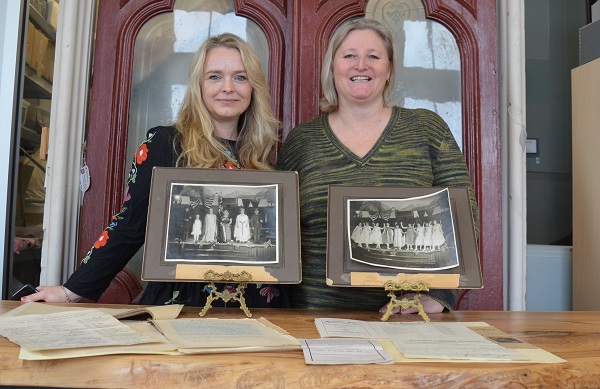Arts and Culture » General News » News
Wave of “silence breakers” inspire new life for century-old project
January 10, 2018 · 0 Comments

By Brock Weir
Silence breakers, the women who spoke up about sexual harassment and intimidation so prevalent within the show business machine, ended the year as Time Magazine’s Person of the Year.
Their efforts sparked inspiring words and a new movement at Sunday’s Golden Globe Awards.
Speaking up on the abuses they’ve suffered, they have sparked a movement that could ultimately be a game-changer in the Hollywood structure, but their words also hit home for Aurora resident Corrie Clark.
As a young actress, Ms. Clark came to know the corridors of power in Hollywood and Hollywood North quite well and added her voice to the #metoo movement. But the movement itself imbued her with a further sense of responsibility as she shepherded a local passion project to fruition.
Ms. Clark, working in close collaboration with the Aurora Museum & Archives, has been tasked with breathing new life into the dusty script to The Temple of Fame, the turn-of-the-century play of historic women jockeying for a place among a pantheon of goddesses.
First mounted locally by prominent Aurora women in 1908 and revived a decade later as a fundraiser for wartime relief, it is being mounted once again this May – just in time for Mother’s Day weekend – to mark its centenary.
Over the course of 100 years, it goes without saying the play was in need of significant update, but it was not a task taken lightly by either Ms. Clark or museum curator Shawna White.
Armed with a Federal Grant to make it happen, the duo set to work bringing The Temple of Fame up to date, doing their best to find a balance between keeping it true to the context in which it was written and removing particular monologues featuring what would be considered racist undertones today.
“You have to honour the time because it happened, that’s how they felt, that’s who those people were, but it is honouring them with being sensitive to today’s sensitivities,” says Ms. Clark, who removed figures from the original who have become obscure due to time, such as the author who billed herself as “Josiah Allen’s Wife” in favour of women like Emily Carr and Pauline Johnson.
“The play itself was put on by women back then as a showcase of the achievements of women,” says Ms. Clark. “It was a novel thing at the time, but we’re still struggling with the same issues. When you read the play, some of the women were obviously dragged, raped and murdered for their causes, but we’re still at a point where anyone who speaks out could lose their jobs. There are lots of those same issues that anyone who is courageous enough suffered for their efforts.”
The premise of the play – original and updated – is a simple one. The lead goddess at the Temple of Fame is tired of doing her job alone and is looking for another woman to help shoulder the load. When it was last mounted in 1918, the metaphor was particularly apt as the world was in a dark place at the height of the First World War and the burden carried by the “goddess” was a heavy one.
In many parts of the world, that darkness is descending once again – or, in some cases, never truly dissipated.
“The whole reason they are having this competition is she’s tired and she needs some help and wants to pass along the mantle as the world is facing dark times again,” explains Ms. White, noting that, once upon a time, many women entered the Temple of Fame but only one emerged victorious. “It was important to change the ending because women for years and years have been pitted against each other. They are judged against each other in competitions for beauty and talent, they compete against each other for the attention of men, so there is a theme of when are we going to stop and start supporting each other and not trying to bring each other down?”
But would the situation be any different if it was a posse of men vying for a place amongst a pantheon of gods? This was a question considered by Ms. Clark as she brought the play up to date.
“If it was a guy trying to be the God of Fame, it would be just like a big chariot match or a drag down fight,” says Ms. Clark. “I tried to rewrite the Goddess in a masculine way. I know from my own work, whenever I felt I was being nice, people thought I was being bitchy, or if people thought I was being masculine and tough, people would say, ‘Oh, what a bitch.’ If it’s a guy, people would say, ‘Oh, he’s strong and confident.’ We’ll see whether the Goddess is taken as strong and confident or completely bitchy at times.
“It is easy to write this off as a ‘chick’ show with a bunch of women posturing, but I hope somewhere within the context of the material there is a great lesson, a message and it is an entertaining evening for everyone to see what happened then, what’s happening now and what has happened in their own lives.”
But, before people take it in, there needs to be a cast. People of all ages and all genders are invited to come out to the Aurora Cultural Centre this Saturday, January 14 and Wednesday, January 17, to audition for The Temple of Fame, whether it is for a role on stage or behind the scenes. All are welcome and all hands are appreciated. For more information on the upcoming auditions for The Temple of Fame, contact Shawna White at swhite@aurora.ca.











